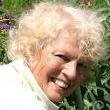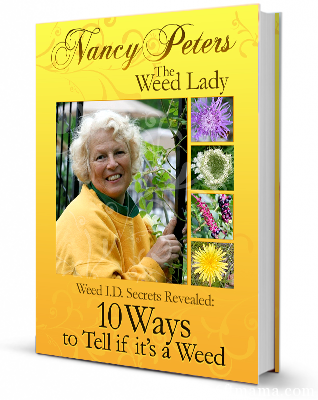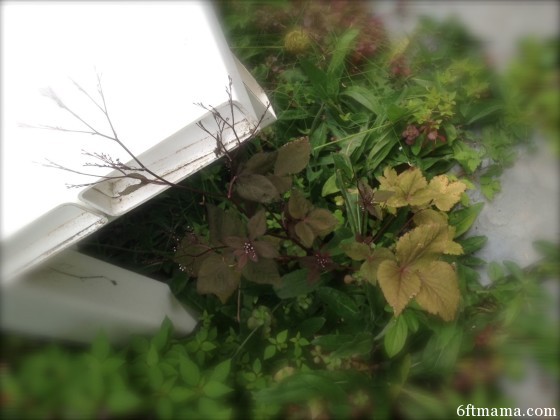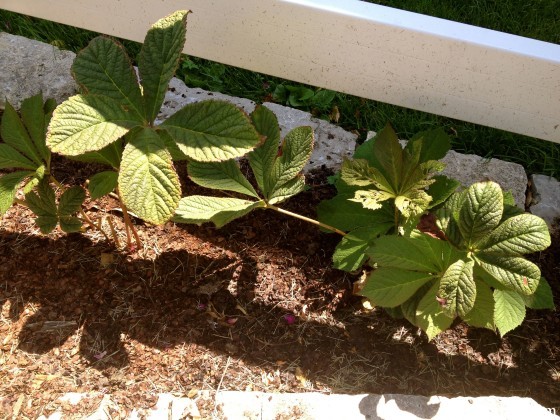SG511 Nancy Peters The Weed Lady: 10 Ways to Tell if It’s a Weed (Part 2)
 In this episode of Still Growing…(SG), I feature SG511 – Part 2 of my interview with The Weed Lady – Master Gardener Nancy Peters. Part 1 was featured in last week’s Still Growing episode – SG510. To recap, Nancy cultivated her passion for weeds after a successful career as a Wall Street Analyst. Nancy’s approach to the study of weeds was born from her curiosity and respect for their resiliency.
In this episode of Still Growing…(SG), I feature SG511 – Part 2 of my interview with The Weed Lady – Master Gardener Nancy Peters. Part 1 was featured in last week’s Still Growing episode – SG510. To recap, Nancy cultivated her passion for weeds after a successful career as a Wall Street Analyst. Nancy’s approach to the study of weeds was born from her curiosity and respect for their resiliency.
Nancy says, “As you get to know and recognize the weed, you can nod at it’s good features or chuckle at it’s ill-repute. You can make a better, informed decision about what to do about it. Whether or not to pull it out or what changes to make if you want to keep it out long term and with less effort. It seems to me that no absolute good or evil holds sway in the garden. Each good has some drawbacks. Each evil has some of it’s benefits.”
As a reminder, Part 1 ended with a revealing look at the Canadian Thistle. In this episode, we continue that discussion and delve further into the fascinating biology of weeds.
Subscribe to Still Growing or Right Click to Download the MP3
Find Still Growing on iTunes or Stitcher Radio
More about Nancy Peters
Nancy began gardening at a weekend home in Westhampton Beach, NY. She now gardens on 10 acres in Spotsylvania, Virginia where she lives with her fiction-writer husband Joe, a retired and published mineralogist. Nancy trained as a Master Gardener at Cornell’s Co-op Extension and as an organic “Green Guerilla” at Nature Lyceum and then taught at both places. She also trained in Botany at Suffolk Community College, lectured at the Organic Turf Trade show, libraries, and clubs, won prizes at rose shows, and landscaped both public and private gardens. Nancy’s book on weeds is an instant gardening classic that everyone from serious gardeners to weekend yard warriors will turn to again and again.
Visit Nancy online: Website | Amazon (where you can download her book on kindle!)
 SG511 Nancy Peters The Weed Lady: 10 Ways to Tell if It’s a Weed
SG511 Nancy Peters The Weed Lady: 10 Ways to Tell if It’s a Weed
- Nancy continues our discussion of Canadian Thistle & it’s cousins (6:15)
- Nancy’s method for fighting invasives – treat it and repeat it: dig down, cover the soil, add compost, plant a competitor(7:15)
- Jennifer installed Rodger’s Plant over Creeping Buttercup
- Wild Invasives: The magical history Mugwort (Chrysanthemum Weed) (10:15)
- The genetic fluidity of Weeds (12:30)
“They [Weeds] are plain more adaptable. The have genetic fluidity that most plants don’t possess. We breed the genetic adaptability [out of] our plants to trade for beauty or edibility or other feature. But no one is cultivating the weeds other than themselves and they want to survive.”
“Nature abhores a vacuum and will cover the soil with something.”
– Nancy Peters
- Weeds genetically morph faster than scientists can say “new formula” (13:45)
“The thing that I love [about weeds] is that they are gender-benders. Weeds will develop more male or female gender cells as needed [to survive].”
-Nancy Peters
- One of Nancy Peter’s least favorite weeds, Red Sorrel – which indicates an acid soil (15:15)
“[Red Sorrel] impugns my skill as a gardener. Every time I see it, I say,
‘You’re telling me something bad about my soil.
I have failed! I have failed!
I have composted.
I have dug you out.
I have composted again.
I have irrigated.
I have planted a competitor,
and yet, you keep returning.
I have failed! I have failed!’
-Nancy Peters
- Mono-cultures or well-organized plantings make weeds stand out. (17:30)
- Nancy’s quick tips for the forgetful gardener (21:30)
- Queen Anne’s Lace (22:30)
On Queen Anne’s Lace: “If you love it, grow it. But, be careful that you don’t eat it because it resembles two of the most toxic plants in the USA: spotted water hemlock and poison hemlock. And, it also resembles a couple of other less poisonous weeds that grow in the USA.
The other downside of growing it is that it can also impugn the quality of your carrot crop. They will cross fertilize with growing carrots; they will crossbreed and they will make your crop inferior.”
-Nancy Peters
- Weeds were a natural part of the original edible landscape(25:18)
- Weeds as featured in The Clan of the Cave Bear books (25:30)
“It’s a wonderful frontier – the edibles. It’s actual old territory that we used to know, but we’ve forgotten.”
-Nancy Peters
- Weeds as outlaws… (28:00)
“It seems to me, that we can interpret the world more easily through human analogy. [I compare weeds to] “the Terminator“. They size up the situation…and then they quickly adapt. Like [the Terminator], when temporarily defeated, what do they say? ‘…I’ll be back‘.”
-Nancy Peters
- Some of the great weed imitators (29:00)
- The photo of Jennifer’s invasive – Nancy identified as Perilla ( 30:00)
 Variegated Artemesia (32:00)
Variegated Artemesia (32:00)- The Lesson of the Potato Famine Potato Blight (33:00)
“When you have a monoculture or something that is bred – where they have the hardiness bred out of them, where they perform so beautifully over time and become so reliable (like impatience), you get to rely on their dependability and their simplicity. But, that simplicity means that any invading bio-organism that can figure out it’s genetic code – which is immutable or unchangeable – that’s it. They’re wiped out.“
-Nancy Peters
- Why herbicide are always behind the weed curve (35:00)
- The prevalence of poisonous weeds (36:30)
- Adding Lime to Delphinium & Clematis (39:30)
- The most important question for weed ID, “Is it something you really want to grow?” (46:00)
“When you know your weeds, you will not be so annoyed when you’re out there spending hours pulling them out.”
-Nancy Peters
- Nancy’s tips on Lawncare ( 51:10)
“Weeds make fewer passes at grass that surpasses“.
-Nancy Peters
- Stay tuned for Nancy’s new book called “Seven Strengths of Weeds and How to Weaken Them“
- Visit Nancy online: Website | Amazon (where you can download her book on kindle!)
Mentioned on Still Growing… this week:
Spotted Water Hemlock – Cicuta Maculata
The Potato Blight of the Potato Famine
Mallow Family (Malvaceae) of Plants
Just a Rose in a Garden of Weeds
Still growing...



Hi Jennifer,
When I read your post, I thought about this little bird outside my window who kept coming back to these flowers there. They had this white fluff that he must have liked for his nest building because he kept coming back to it and chewing off a bit more. When I went back to look more closely, it was a weed that had grown up there from my neglect of my garden this summer. I laughed and thought about how we get rid of these weeds but sometimes they are helpful too!
Yep! Those weeds are Masters of Disguise! The birds are less discriminating.
I share her same reasoning. I was amazed at how weeds endured. Also, many perennials had their starts as lowly weeds. If only they retained the full drought tolerance. I did not know that QAL would cross with carrots. Good to know. I enjoyed the podcast. I will be getting her book too. I need to know more of the weeds and her book really sounds informative.
Donna –
I’m so glad you liked the podcast. Still Growing… just started in June and it has been so very fun to produce each show. Nancy’s book is really great and as you can tell, she is knowledgeable and passionate about weeds! Sweet, too.
Jennifer
[…] Be sure to catch my latest podcast, Still Growing – you can catch Part 2 of my interview with Nancy Peters, The Weed Lady! […]
[…] In this episode of Still Growing…(SG), I feature the uber-knowledgable Nancy Peters, also respectfully known as “The Weed Lady”. Lest you think sweet little Nancy has spent a lifetime hunched over weeding, this Columbia Business School graduate enjoyed a successful career as a Wall Street Analyst with EF Hutton, Shearson, Morgan Stanley, Mobil, Prudential Securities, Smith Barney and EJ Lance. As Nancy tells it, she “went from Wall Street to Weeds.” And, I am so happy she did. Nancy is a charming interview and a dedicated gardener who generously shares her encyclopedic knowledge of weeds with us in this episode of Still Growing. This episode will cover Part 1 of our discussion. Part 2 will be featured in next week’s episode of Still Growing. […]
[…] Decoding Garden AdviceEpisode SG505 […]